How to Scrape Vacation Rental Pricing Strategies for Better Business Opportunities?

Introduction
In the competitive world of vacation rentals, pricing plays a pivotal role in determining success. With numerous factors influencing rental prices, such as demand, location, amenities, and seasonal fluctuations, it can be difficult to keep up with the latest trends. However, leveraging Scrape Vacation Rental Pricing Strategies using web scraping techniques can provide invaluable insights, helping businesses make informed decisions and stay ahead of the competition. By monitoring vacation rental market trends, pricing models, and demand fluctuations, businesses can optimize their pricing strategies, boost occupancy rates, and ultimately improve profitability.
In this blog post, we will explore how Web Scraping Strategies for Vacation Rental businesses can be employed to gather key data and stay competitive. We will also discuss how Vacation Rental Pricing and Demand Data Scraping can help businesses better understand customer preferences and market conditions. Additionally, we will look into how Extract Real-Time Vacation Rental Market Data can offer accurate insights to help businesses adapt to shifting demand patterns.
The Role of Vacation Rental Pricing Strategies in Business Success
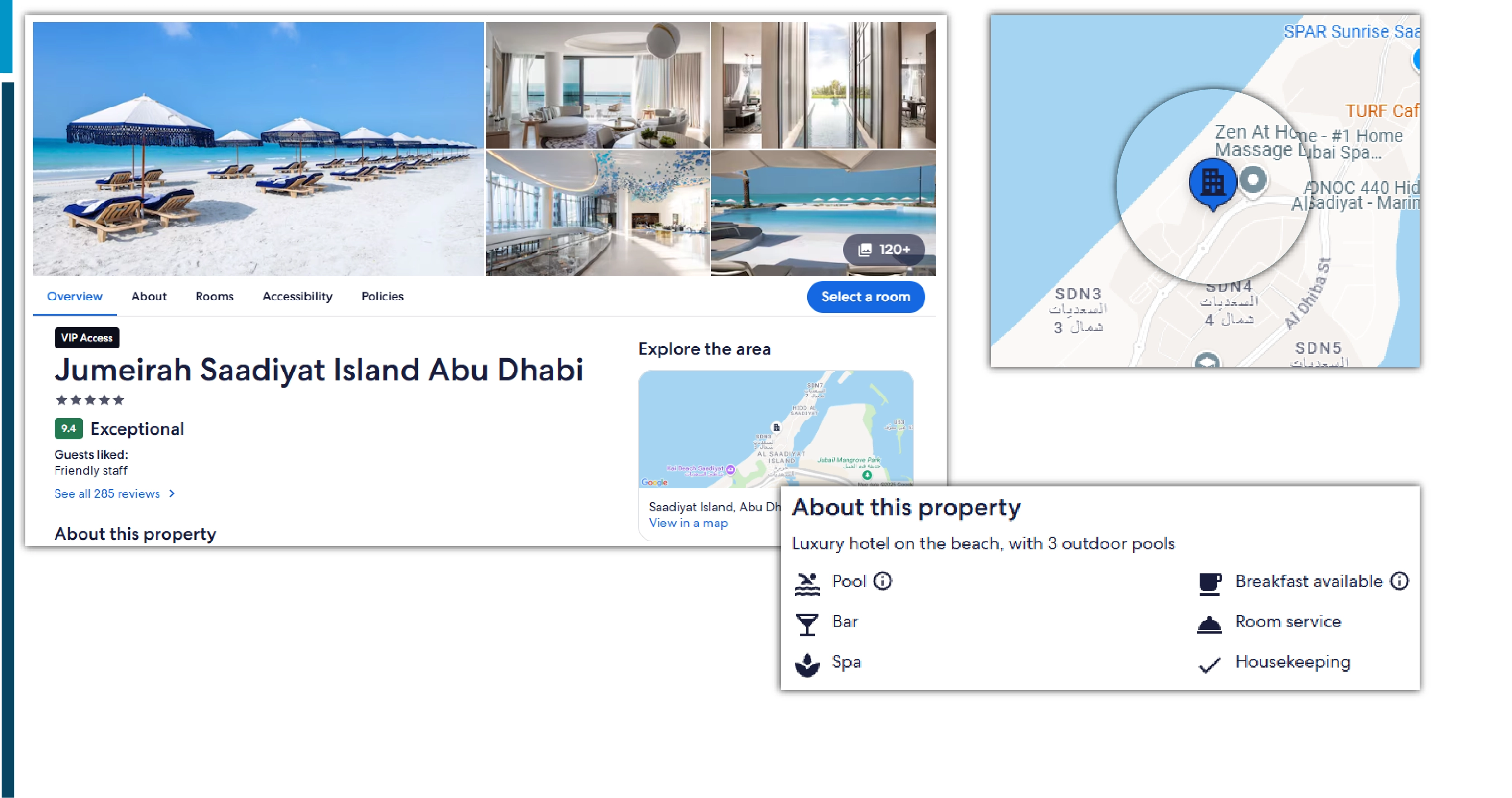
Pricing is one of the most important elements in the vacation rental business. Whether you're an owner of a single property or managing a portfolio of vacation homes, your pricing strategy can make or break your business. Without a proper strategy in place, your property could go unbooked, or worse, underpriced, leaving money on the table.
Vacation Rental Pricing Strategies often involve a combination of the following:
Dynamic Pricing: Adjusting prices based on demand, time of booking, or special events in the area.
Competitive Pricing: Setting prices based on what similar properties are charging.
Seasonal Pricing: Raising prices during peak seasons and lowering them during off-peak times.
Minimum Stay Requirements: Implementing policies that require guests to book for longer periods during high-demand periods.
Having access to real-time data about the pricing landscape is crucial in implementing these strategies effectively. This is where Web Scraping Strategies for Vacation Rental come into play.
Web Scraping Vacation Rental Pricing Data
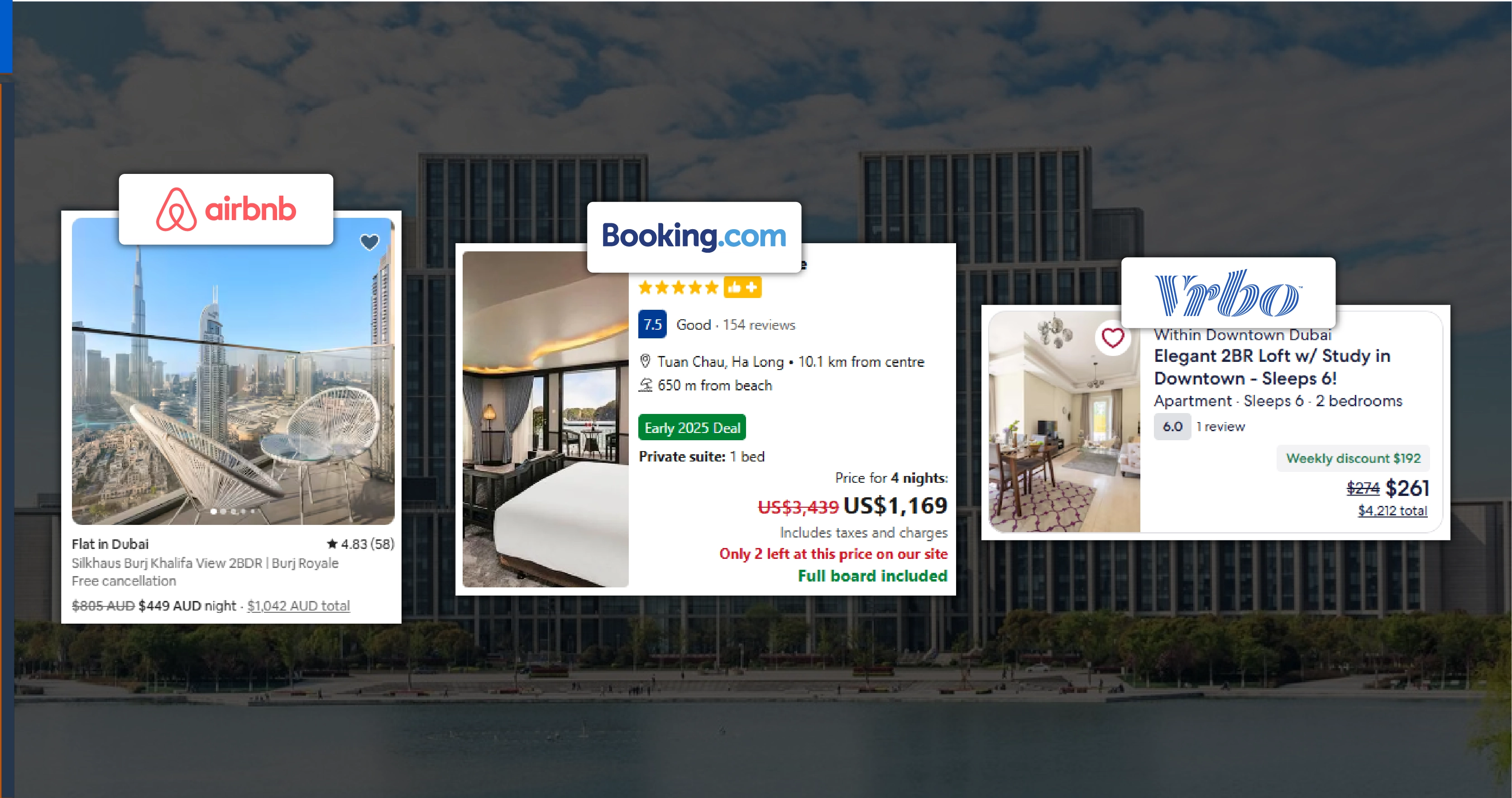
Web scraping is an effective technique to gather large amounts of data from various vacation rental websites. By extracting pricing information from popular platforms such as Airbnb, Booking.com, Vrbo, and others, businesses can get an accurate view of the competitive landscape. This helps in identifying trends, setting optimal prices, and ensuring that properties are priced appropriately.
Here’s how Vacation Rental Pricing and Demand Data Scraping can be implemented:
Identifying Competitors
Scraping competitor websites helps gather pricing data from other vacation rental properties. This allows businesses to benchmark their pricing strategy against competitors in the same location or with similar amenities.
Monitoring Price Fluctuations
Extract Real-Time Vacation Rental Market Data allows businesses to track changes in rental prices over time. By continuously monitoring pricing trends, businesses can adapt their strategy to adjust rates dynamically based on market conditions.
Analyzing Seasonal Trends
By scraping data on seasonal pricing, businesses can identify patterns and adjust their prices based on demand shifts. This can be especially useful during holidays, festivals, or local events when prices tend to fluctuate.
Demand Analysis
Scraping data about the availability of properties in a particular area can give businesses insights into demand patterns. A surge in bookings at a certain time may indicate higher demand, prompting businesses to raise their prices or adjust their marketing efforts.
Benefits of Web Scraping for Vacation Rentals

By utilizing Web Scraping Tips for Vacation Rental Growth, businesses can unlock several benefits that improve their bottom line and operational efficiency:
Competitor Analysis
Understanding competitor pricing and booking patterns helps businesses price their properties competitively. Scraping data from competitor websites gives businesses the upper hand by providing access to live data on prices, availability, and market demand.
Improved Revenue Management
Web scraping enables businesses to implement dynamic pricing models that automatically adjust prices based on various factors like demand, location, and seasonality. This helps maximize revenue by capitalizing on peak demand periods and minimizing losses during low-demand times.
Market Trend Insights
Scraping data from multiple vacation rental platforms provides businesses with a broader view of the market, allowing them to stay up-to-date on trends in the vacation rental industry. This insight can be leveraged to fine-tune pricing strategies, optimize property features, and improve customer experience.
Better Forecasting
Real-time data scraping provides accurate, up-to-date information on demand and pricing trends. This allows businesses to better forecast demand fluctuations and make more informed decisions about pricing and property availability.
Minimize Overpricing and Underpricing
By analyzing real-time data on pricing and demand, businesses can avoid overpricing (which can drive customers away) or underpricing (which can result in missed revenue). Web scraping allows businesses to identify the sweet spot in pricing that will maximize revenue while ensuring competitive positioning.
How to Extract Vacation Rental Website Data?
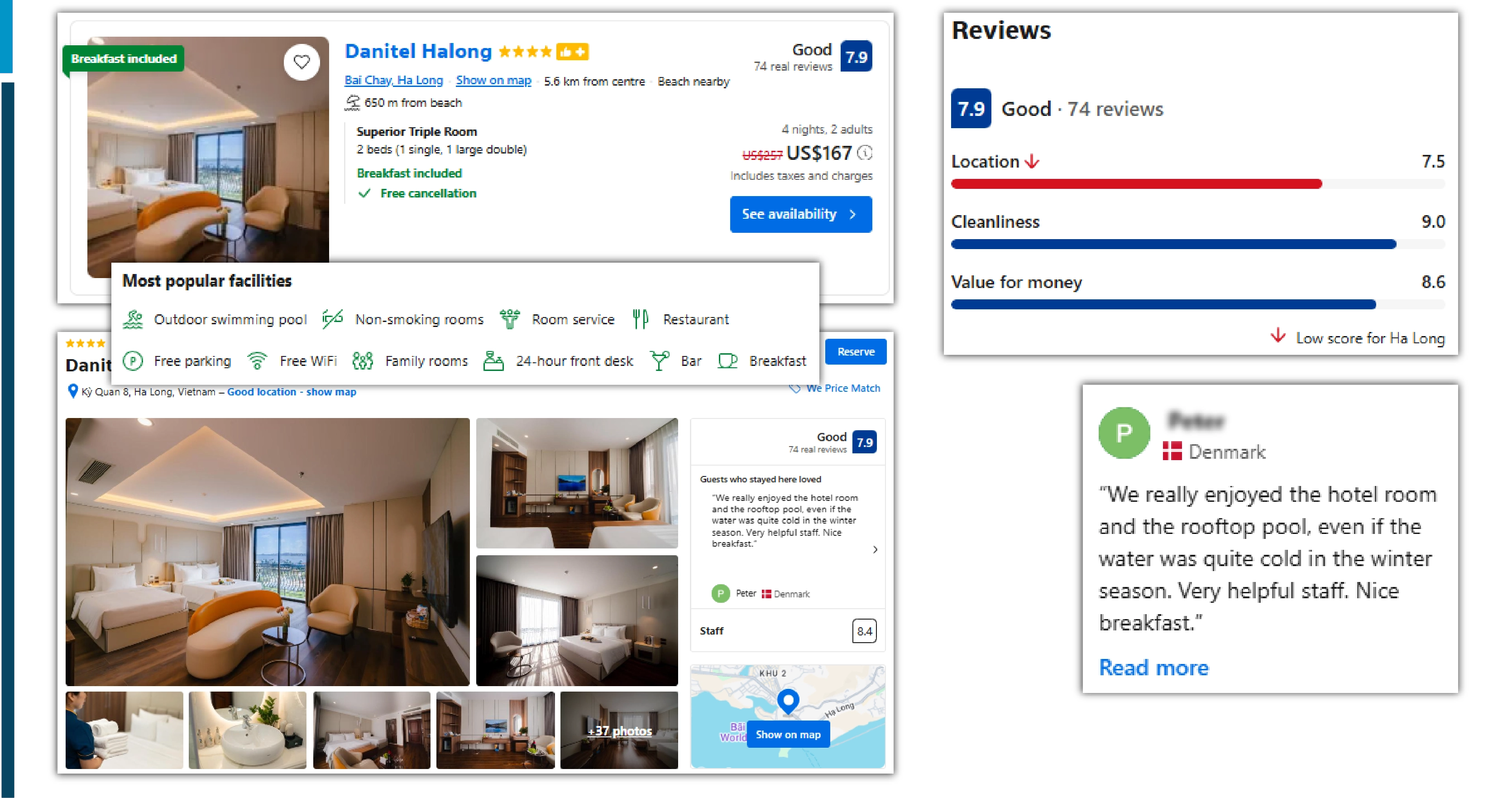
To harness the full potential of Extract Vacation Rental Website Data, businesses must first set up a system to extract the necessary data from vacation rental websites. Here are some key data points to scrape:
Property Prices: Extracting the prices for properties listed on rental websites gives businesses insights into the competitive landscape. This helps businesses understand how their pricing compares to similar properties in the same area.
Availability Data: Scraping availability data shows which properties are booked and when, helping businesses identify high-demand periods and optimize their own booking calendar.
Customer Reviews: Scraping customer reviews provides insight into guest satisfaction levels and can help businesses understand what amenities or features are most valued by guests. Positive reviews can be used as a marketing tool, while negative feedback can be addressed to improve the property.
Location Data: Extracting location-specific data helps businesses identify the most profitable locations based on demand and occupancy rates. Location data can also assist in identifying emerging markets and untapped opportunities.
Property Features and Amenities: Scraping detailed information about the amenities provided by other properties can help businesses enhance their offerings to better meet customer expectations.
Travel Industry Web Scraping and Its Role in Growth
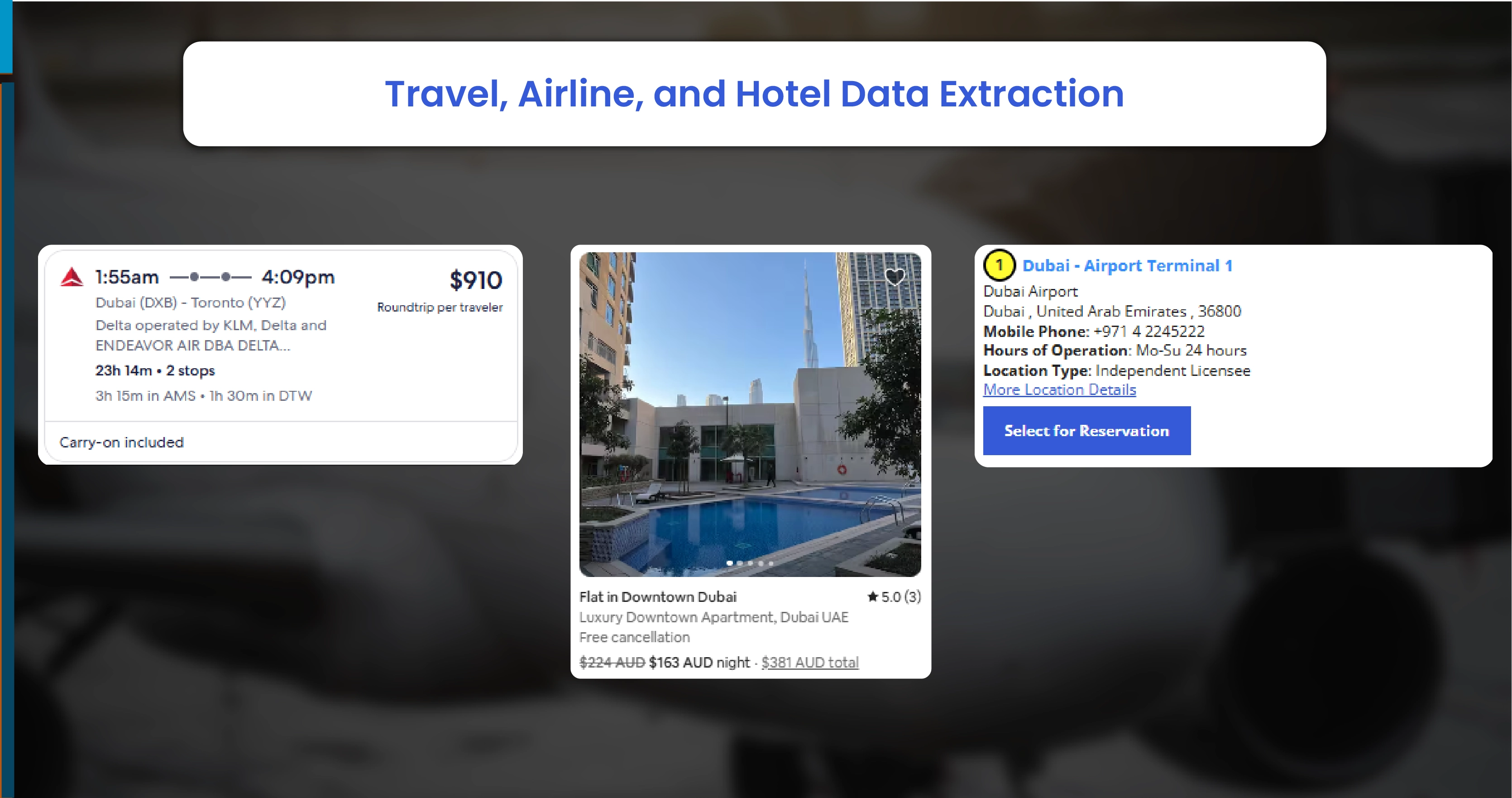
The broader Travel Industry Web Scraping ecosystem offers opportunities for vacation rental businesses to optimize not only their pricing strategies but also their marketing efforts, customer engagement, and service offerings. In today’s digital age, scraping data from multiple travel-related platforms like airline websites, hotel booking sites, and online travel agencies (OTAs) is crucial for gaining a comprehensive understanding of the market.
Scraping data from Travel, Airline, and Hotel Data Extraction sources enables businesses to stay updated on global trends, cross-promote services, and create competitive offerings. For example, businesses can use data about airfares or nearby hotel prices to offer bundled services or promotions, creating a more attractive package for potential customers.
Web Scraping Tips for Vacation Rental Growth
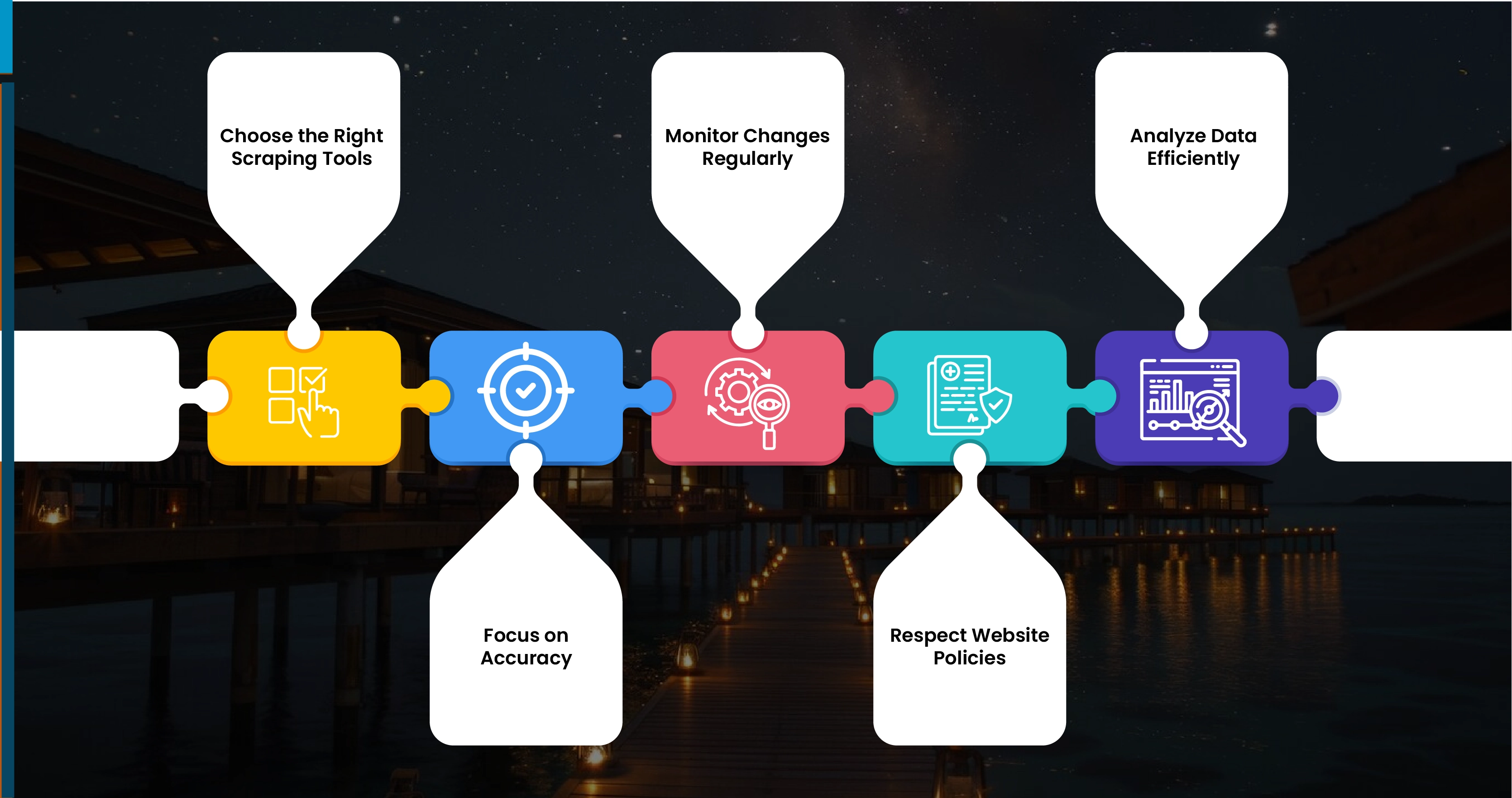
To ensure the success of Web Scraping Vacation Rental Website Data, businesses need to follow a few best practices:
Choose the Right Scraping Tools: Selecting the right web scraping tools and technologies is essential. Some tools are designed specifically for extracting vacation rental data, while others are more general-purpose
Focus on Accuracy: Ensuring that the data collected is accurate and relevant is crucial. Inaccurate or outdated data can lead to poor decision-making and harm business performance.
Monitor Changes Regularly: Vacation rental prices and demand patterns change frequently. Set up automated systems that monitor websites regularly to gather up-to-date information.
Respect Website Policies: Always ensure that your web scraping activities comply with the terms and conditions of the websites you’re scraping. Some websites may block or restrict scraping activities, so it’s essential to follow ethical guidelines.
Analyze Data Efficiently: Once data is collected, businesses should focus on analyzing it for actionable insights. Use data analytics tools to process and make sense of large volumes of data.
Conclusion
In conclusion, Scrape Vacation Rental Pricing Strategies and Web Scraping Strategies for Vacation Rental are powerful tools that can help businesses stay ahead of the competition. By using Vacation Rental Pricing and Demand Data Scraping and Extract Real-Time Vacation Rental Market Data, businesses can optimize their pricing strategies, improve customer engagement, and grow their presence in the market.
With Travel Scrape, businesses can access advanced Travel Scraping API solutions for Web Scraping Vacation Rental Website Data and much more, allowing them to stay ahead of market trends and adapt to shifting demand. Whether you're scraping data for pricing strategies or gathering information on vacation rental websites, Travel Scrape provides the tools to ensure your business remains competitive in the ever-evolving travel industry.
Additionally, as Travel aggregators continue to evolve, the need to Scrape Mobile Travel App Data has become increasingly important. With the right tools and strategies in place, your vacation rental business can thrive in a dynamic marketplace.
Get started with Travel Scrape today to unlock the full potential of your vacation rental business!